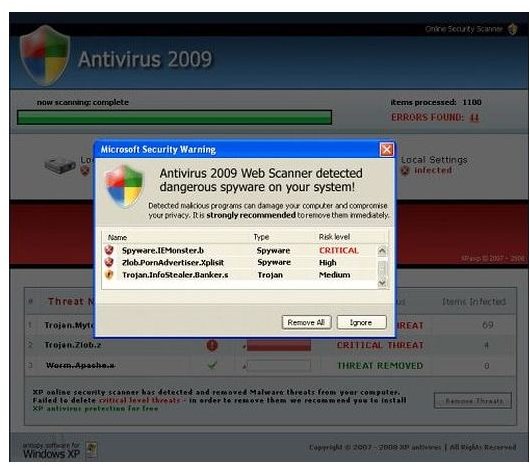Cybercrime Trends in 2010 - Charity Scams, Tax Scams, Facebook Scams, Fake Virus Scanners and More
Charity Scams
Cybercrime trends tend to fluctuate with current events. It’s sickening how whenever a natural disaster occurs, pretty soon thereafter you will hear about imposter charities trying to get some of the money that well-meaning people want to donate. You just have to be very careful who you give money or personal information to, especially on the internet.
Before you donate any money to a charity, make sure it is the real deal. With the recent problems following the earthquake in Haiti, a slew of con artists started trying to trick people out of their money. The FBI even put out an alert back in January that warns people if anyone claiming to be an earthquake victim tries to contact them. This just goes to show you how uncaring these criminals really are when they prey on the good will of others.
Tax Scams

During April when income tax season is going full speed in the United States, there are numerous scams to be found when it comes to tax returns and filings. The most common tax scam is a basic phishing attempt built around tax returns. You’ll get an email that looks like it is from the IRS, and in the email they will claim to need more information from you in order to process your return. To help butter you up, they might promise thousands of dollars in tax return money if you give them what they want. With many people filing their taxes electronically, and some perhaps not knowing any better, this can be an easy scam to catch the unsuspecting.
To help combat this annual problem, the Internal Revenue Service maintains a web page full of information regarding all the various tax scams that pop up throughout the year.
Facebook Scams

Social networking sites like Facebook are still extremely popular these days, so they make a prime target for scammers looking to con people into giving up their private information. Where MySpace used to be overrun with spammers from porn sites and crappy bands trying to pad their list of friends, Facebook has the occasional surge of bogus apps that redirect users to sites that try to make them download things like fake security software.
I am a pretty avid Facebook user and have seen firsthand the results of a bogus app that tried to trick people into thinking they could see who was looking at their profile. I don’t remember the exact wording, but the idea was that if you allowed this app onto your profile, it would let you see if anyone that wasn’t your friend had been searching for you or looking up your information. If such a thing did exist, it would be nice to have, but it does not exist. Instead, people who signed up for the app would get redirected to a website outside of Facebook where it tried to make them install what turned out to be fake security software that took over their system.
Fake Security Software

When it comes to cybercrime, I think the most bothersome of them all is the widespread infections of fake security software. These programs are designed to look like real virus scanners or antispyware software, and they bombard you with pop-up messages and disable certain system utilities by saying your computer is infected and the only solution is to buy an upgrade to get rid of the viruses and malware. If you give in and make the purchase, then you are giving your credit card information away to scammers. What annoys me so much about these type scams is how commonly found they can be, and most of them come in through advertising feeds that aren’t monitored by the sites than run the ads.
How to Avoid Being a Victim of Cybercrime
The best way to protect yourself from cybercriminals is to be smarter than them. The key to doing so is to be suspicious of everything that seems even the slightest bit untrustworthy. Don’t respond to email solicitations for any reason. Don’t even respond to phone calls to your home, because scammers often take the direct approach that way, too. If you keep abreast of all the criminal activity going on out there, then you’ll be better able to recognize a potential thread and keep yourself from being the next victim.
